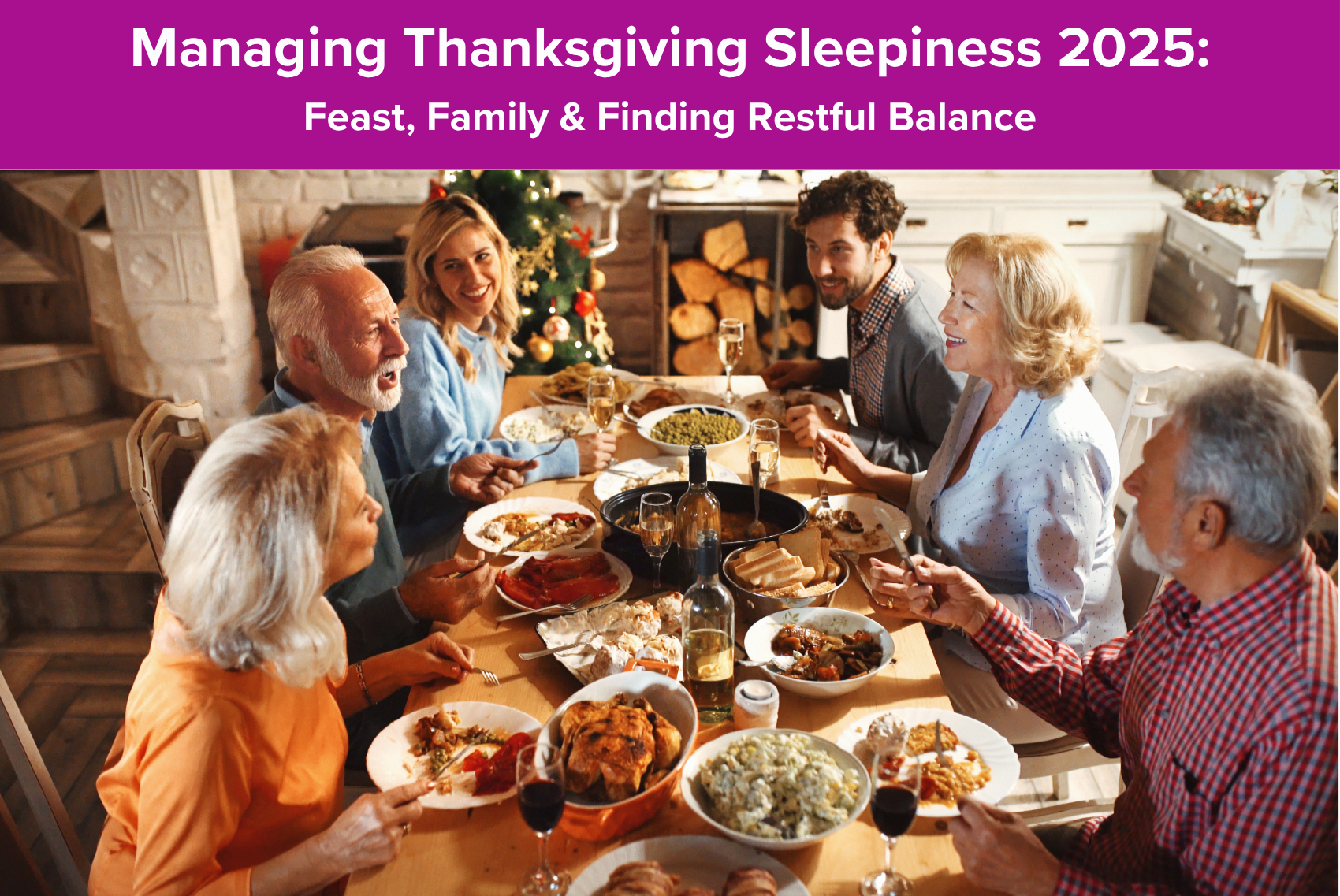 Ah, Thanksgiving — a time of gratitude, family, and that all-too-familiar post-feast drowsiness that seems to strike right as the football game begins. Between the turkey, mashed potatoes, and pumpkin pie, it’s no wonder so many of us find ourselves drifting toward the couch. But what really causes that Thanksgiving sleepiness — and how can you enjoy the meal without derailing your sleep schedule?
Ah, Thanksgiving — a time of gratitude, family, and that all-too-familiar post-feast drowsiness that seems to strike right as the football game begins. Between the turkey, mashed potatoes, and pumpkin pie, it’s no wonder so many of us find ourselves drifting toward the couch. But what really causes that Thanksgiving sleepiness — and how can you enjoy the meal without derailing your sleep schedule?
The Truth Behind the “Turkey Coma”
Turkey often gets blamed for Thanksgiving fatigue due to its tryptophan content — the amino acid used by the body to produce serotonin and melatonin, both important for sleep regulation. But here’s the truth: turkey isn’t unique. Chicken, beef, and even some plant-based proteins contain similar levels of tryptophan.
So what’s really behind the Thanksgiving nap?
It’s the combination of a large, carb-heavy meal, alcohol consumption, and a spike (then crash) in blood sugar. The body works overtime to digest the heavy mix of carbs, fats, and sugars, pulling blood flow toward the digestive system and away from the brain and muscles. This natural redistribution of energy creates that unmistakable wave of post-dinner sleepiness.
Add in a glass (or two) of wine, and your body relaxes even further — but at the expense of alertness and sleep quality later in the night.
The Science of Holiday Fatigue
Thanksgiving fatigue isn’t just about food — it’s about rhythm disruption. On holidays, we tend to wake up earlier to start cooking, eat at odd times, and go to bed later than usual. This shift in our circadian rhythm (our internal sleep-wake clock) can leave us feeling sluggish and unfocused.
Our brains love consistency. When we eat large meals at irregular times, drink alcohol, and skip our usual movement or sunlight exposure, our internal clock struggles to adjust. The result? A combination of blood sugar imbalance, dehydration, and sleep disruption that can leave you yawning well before dessert.
Smart Strategies for Post-Feast Energy
Enjoying Thanksgiving doesn’t mean you have to fight fatigue the entire day. With a few mindful strategies, you can celebrate to the fullest while keeping your energy steady and your sleep on track.
1. Go Easy on Portions (But Enjoy Every Bite)
Mindful eating helps you savor your meal and recognize fullness before feeling sluggish. Try building your plate with a balance of lean protein, complex carbohydrates, and colorful vegetables. Eat slowly, put your fork down between bites, and pay attention to when you feel satisfied rather than stuffed.
2. Move After the Meal
A brisk walk with family after dinner isn’t just tradition — it’s science. Even 10–15 minutes of light activity helps your body digest food, stabilizes blood sugar, and prevents that heavy, sleepy feeling. Walking also gives you a mental refresh before dessert or evening festivities.
3. Keep Hydrated
Holiday beverages like wine, cocktails, or cider can dehydrate you, contributing to fatigue and even headaches. For every alcoholic drink, have a glass of water. Proper hydration improves digestion and helps maintain your energy levels throughout the day.
4. Take a Power Nap — the Right Way
If you can’t resist a post-meal snooze, keep it short — about 15 to 20 minutes max. This brief “power nap” helps refresh your brain without entering deep sleep stages that lead to grogginess. Choose a quiet, comfortable spot, set an alarm, and avoid napping too late in the day so it doesn’t interfere with your nighttime sleep.
5. Protect Your Bedtime Routine
After a busy holiday, returning to your regular sleep schedule is key. Limit late-night snacking, dim the lights early, and create a calm bedtime routine — maybe a warm shower, a soothing playlist, or gratitude journaling. Small rituals help signal to your body that it’s time to wind down, even after a lively day.
🦃 Thanksgiving Sleepiness Q&A: Expert Answers to Your Post-Feast Questions
Q: Is turkey really what makes you sleepy on Thanksgiving?
A: Not quite! While turkey contains tryptophan — an amino acid linked to sleep — it’s not the main cause of your post-meal drowsiness. The real culprits are the large portions of carbohydrates, sweets, and alcohol that lead to a spike (and later crash) in blood sugar. That crash, combined with the body diverting energy toward digestion, creates that famous “Thanksgiving nap” feeling.
Q: Can I avoid the afternoon crash without skipping dessert?
A: Absolutely! Try eating slowly and savoring your food — this gives your brain time to register fullness. Pair your dessert with some protein or fiber (like a handful of nuts or fruit) to slow the absorption of sugar. Staying hydrated and taking a short walk after eating can also help steady your energy.
Q: Does alcohol make Thanksgiving sleepiness worse?
A: Yes. Alcohol can initially make you feel relaxed and sleepy, but it actually disrupts deep sleep later in the night. If you enjoy a drink with dinner, alternate with water and limit intake closer to bedtime to avoid restless or fragmented sleep.
Q: What’s the best way to nap after Thanksgiving dinner?
A: If you really need a nap, keep it short — about 15 to 20 minutes. This “power nap” helps refresh you without entering deep sleep stages, which can cause grogginess or make it harder to fall asleep at night. Choose a quiet spot, avoid lying completely flat, and set a gentle alarm.
Q: How can I protect my sleep schedule after a big holiday meal?
A: Maintain your usual bedtime routine as much as possible. Dim the lights an hour before bed, avoid late-night snacking, and give your body time to digest before lying down. A calming activity — like reading, stretching, or writing in a gratitude journal — helps your body wind down naturally.
Q: Are there healthier meal swaps that can help me feel less sluggish?
A: Definitely! Try incorporating complex carbs like sweet potatoes instead of white bread rolls, and include plenty of vegetables and lean proteins. Using smaller plates can also encourage portion control without sacrificing flavor or enjoyment.
Q: I travel for Thanksgiving — how can I manage jet lag and big meals?
A: Adjust your sleep and meal times gradually a few days before your trip to align with your destination. Stay hydrated, get sunlight exposure during the day, and avoid caffeine late in the afternoon. A light walk after your Thanksgiving meal can also help your body reset its internal clock.
Q: What should I do if I feel overly tired for several days after Thanksgiving?
A: Persistent fatigue might mean your sleep cycle or digestion needs rebalancing. Return to your normal routine, focus on balanced meals, hydration, and consistent bedtimes. If the tiredness lingers beyond a few days, it may be worth consulting a sleep specialist to rule out underlying sleep issues like sleep apnea, insomnia, or circadian rhythm disorders.
Rest, Relax, and Reconnect This Thanksgiving
Thanksgiving is about connection, gratitude, and nourishment — not exhaustion. By understanding what truly causes post-feast fatigue and making small adjustments, you can enjoy the day without feeling drained.
This season, give yourself the gift of balance: savor the feast, stay active, and protect your rest.
Whether you’re hosting, traveling, or simply enjoying the company of loved ones, a few mindful choices can make all the difference between feeling sluggish and feeling refreshed.
Sweet dreams and happy Thanksgiving from all of us at:
📍 Sleep Medicine Consultants
📞 (512) 420-9900
🌐 sleepdoc.net
